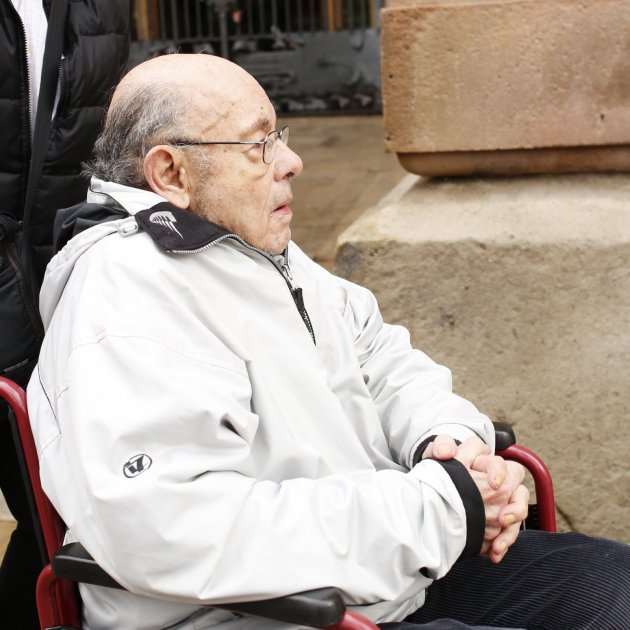Fèlix Millet, the Catalan businessperson convicted for plundering the Palau de la Música, which he directed, died this Thursday at the age of 87. The final years of his life were marked by the conviction for his role in the corruption case centred on the celebrated Barcelona cultural institution. Specifically, this February, a penitentiary surveillance judge allowed Millet to return to a private residence to serve the sentence of 9 years and 8 months in prison that began in 2020.
In recent months he had been in and out of prison due to illness, making several transfers between the prison of Brians 2 and the Penitentiary Hospital of Terrassa. He died in this latter residence where he was serving his sentence, despite the fact that he encountered a great deal of reluctance in the justice system to him serving a large part of his sentence away from prison.
Millet was president of the Fundació Orfeó Català i del Palau de la Música Catalana, the foundation which ran the choral society and the modernista musical palace, from 1990 until he was dismissed in 2009, when the case became public. That was the moment in which his great fall began, changing the legacy of someone who had been greatly admired.
The last public appearances of Fèlix Millet have been marked by the deterioration of his health. Photo: Europa Press
The Palau case
The Palau case was in the Catalan news headlines for years: from the first police search of the grand palace in 2009 until the convictions in 2020. After so many years of investigation and litigation, the trial concluded that both Millet and his right-hand man, Jordi Montull, had stolen 23 million euros from the Catalan institution. In addition to the social indignation over this major corruption case, it also caused political uproar, because Convergència Democràtica, the senior partner in the Catalan governing coalitions of the 1980s and 90s, was fully implicated in the scandal, having used the cultural institution to finance itself irregularly. The party was fined and its ex-treasurer Daniel Osàcar was jailed. Fèlix Millet, as mentioned was sentenced to close to 10 years in jail and a fine of 4.1 million euros, while Montull was ordered to serve 7 years and 6 months in prison and pay a fine of 2.9 million euros.
However, the build-up to these convictions was long and media-intensive. A month after the 2009 search by the Mossos d'Esquadra that made the case public, Millet confessed in a letter addressed to the judge of the case and the newspaper La Vanguardia. In the letter he acknowledged having stolen 3 million euros from the institution, a figure that would multiply as the investigation continued.
But how did the suspicions about illegal activities in an institution like the Palau begin? The Spanish treasury and the public prosecutors were alerted by the large number of 500-euro notes that were circulating in transactions connected to the Palau de la Música. That's why they started to investigate, together with the police, and came across a veritable pharaonic network. Fake invoices, large amounts of cash and even gold bars.
Almost 20 years at the helm of the Palau de la Música
Millet was born in 1935 and was the fourth of five siblings. His origins link him to the Catalan bourgeoisie that had made a fortune in textiles. His uncle Lluís Millet was the co-founder of the Orfeó Català choral society, a fact that tied him to culture from a young age. In addition, his father was president of the Orfeó, between 1951 and 1967. So from a young age he knew the entire Catalan cultural world very closely. Later, he ended up being president of the Palau de la Música between 1990 and 2009, when the whole Palau case was uncovered.
In 1999, Millet received the Sant Jordi Cross, the highest Catalan honour, which he returned in 2010 when the Palau case broke. Photo: Gencat Archive
2017: the Palau trial begins
Almost 10 years after the TV news showed the Mossos searching the hallowed cultural sanctuary, images that put an end to Millet's presidency, the trial began. Specifically, on March 1st, 2017. With a summary document of more than 60,000 pages, the anticipation in the courtroom was enormous.
After a four and a half month trial, Fèlix Millet was sentenced to 9 years and 8 months in prison for four different crimes of embezzlement and funds misappropriation, influence peddling, money laundering and crimes against the public treasury. The sentence also included a fine of 4.1 million euros and the obligation to return 23 million euros to the Palau institution, jointly with the rest of those convicted: up until November 2022, the Barcelona Audience had recovered 12 million euros. All of this was ratified by the Supreme Court when it heard appeals in 2020.
Condolences from the Palau de la Música
The Orfeó Català and the Fundació Orfeó Català-Palau have sent their condolences for the death of Fèlix Millet this Thursday to the family "for the loss". In a short statement, the organization recalls that he was president of the Orfeó Català (from 1978) and president of the Fundació Orfeó Català-Palau de la Música Catalana (from 1990), until he was dismissed in 2009 when the embezzlement from the body came to light, in what is known as the Palau case.
Reaction from president Pere Aragonès
The president of Catalonia, Pere Aragonès, has reacted to the news of the death of Fèlix Millet from Argentina, where he is on an official visit. Aragonès said: "Sadly, Millet will be remembered for his role in the corruption case at the Palau de la Música." The president of the Generalitat added that Millet "damaged an important cultural institution" in Catalonia and added: "More than ever we have to carry on against corruption in order to strengthen the institutions".
